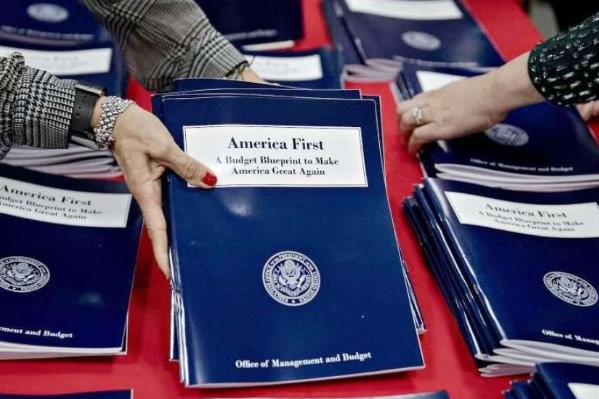AFP photo
By
Ricardo Swire
On Tuesday May 23, 2017 the United States of America’s 2018 Budget slashed US$667 million from grant programs for counter-terrorism funding provided to state and local agencies, the US Financial Plan reducing money allocated to development banks such as the World Bank.
Previously the White House requested US$1.7 billion from the Department of the Treasury for Latin America and Caribbean territories. The money was channelled through the State Department and US Agency for International Development (USAID), multilateral agencies, such as the World Bank, utilized as indirect distributors.
Fifteen regional nations belong to America’s Caribbean Basin Security Initiative (CBSI), part of an integrated security effort that incorporates the Merida Initiative in Mexico, Central America’s Regional Security Initiative and Colombia’s Strategic Development Initiative. For the first three years of operation America committed US$203 million. Caribbean aviation security, guided by the CBSI, enhanced processes and procedures to maintain International Civil Aviation Organization (ICAO) standard.
Specialized training is sponsored by the Organization of American States (OAS) and conducted by US Transportation Security Administration (TSA) officials. The US driven Program routinely provides financial assistance to CARICOM’s Advance Passenger Information System (APIS) Center headquartered in Barbados. The Center helps identify transiting individuals suspected of connections to criminal or terrorist organizations.
CBSI programs assist Caribbean member states adopt novel legislation, adjust criminal codes, upgrade technology and improve domestic evidence gathering techniques. The May 2017 US Department of the Treasury, Internal Revenue Service (IRS), Criminal Investigation financial investigations workshop in Grenada, assisted Eastern Caribbean police and Financial Intelligence Units (FIUs) fine tune skills.
Members confront transnational drugs traffickers and organized criminal activity. Improved regional maritime and aerial radar management, through better coverage and data sharing, are results of CBSI involvement. As part of the US 2018 Budget the Department of State’s Bureau of International Narcotics & Law Enforcement Affairs, regarded as main interface with the CBSI, will function with US$1.4 billion or ten percent less money.
The United States Coast Guard (USCG), coupled with American government partners, have provided boats and training valued no less than US$10.9 million to date. The 2018 US Budget adds US$249 million to the Federal Bureau of Investigations (FBI) for counter-terrorism, cyber threats, more crime data and timely firearms purchase antecedents. Regional distribution of ballistics and fingerprint data, facilitated by the FBI, are CBSI promotions.
Prior to the new US Budget CBSI provided significant financial aid to the Organization of Eastern Caribbean States (OECS), Dominican Republic (DR) Guyana, Jamaica and Trinidad & Tobago for contraband interdiction, drug seizures and eradication operations. Top bosses reinforced commitments to intelligence sharing and quicker national resources deployment. The US 2018 Budget lowered Counter-narcotics operations cash from US$476 million to US$374 million.
Latin America and Caribbean financial allocations lessened from US$1.71 billion in 2016 to US$1.09 billion for 2018. A thirty-five percent drop and lowest funding to this region since 2001. CBSI’s participants are affiliates of the Global Supply Chain Security Initiative, a special protection program for commercial goods. Such economies enjoy duty-free access to the US commercial market for most goods. As part of the World Customs Organization (WCO) Caribbean benefactors are among more than sixty “Program Global Shield” countries.
Program Global Shield was created to minimize theft or diversion of fourteen precursor chemicals used to make Improvised Explosive Devices (IED). America’s 2018 Budget significantly impacts the CBSI’s fluidity. Compared to FY 2016 statistics a thirty percent decrease for Caribbean military, law enforcement and counter-drug trafficking programs is registered. Washington’s official financial presentation also reduces monies allocated to combating transnational crime, from US$211 million to US$136 million.
Internal security decision makers in the Caribbean Basin’s most violent drug transit zone, Central America’s “Northern Triangle,” will be further challenged by a thirty-four percent spending adjustment, in recognition of reduced American funds. The new Budget provides US$2.6 billion to the Department of Homeland Security (DHS), for “border infrastructure and immigration enforcement.” Washington has set aside US$1.6 billion, for estimated cost of seventy-four miles of physical wall constructed along the Mexican border, a project that expends more than US$21 million per mile.
Ricardo Swire
Ricardo Swire is the Principal Consultant at R-L-H Security Consultants & Business Support Services and writes on a number of important issues.



No Comments Yet!
You can be first to comment this post!